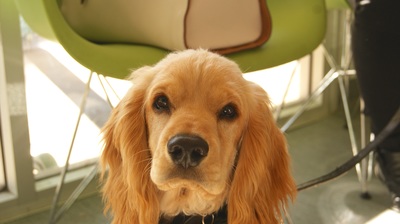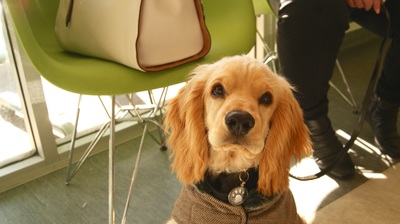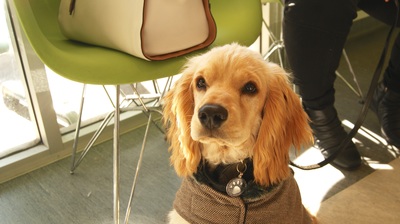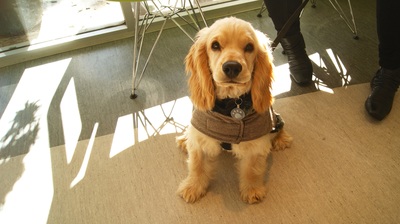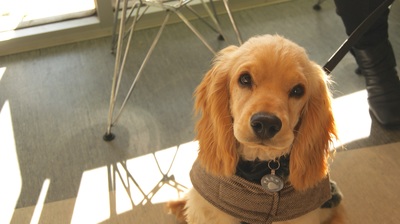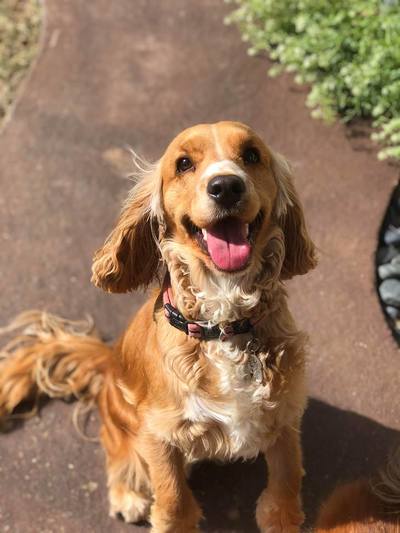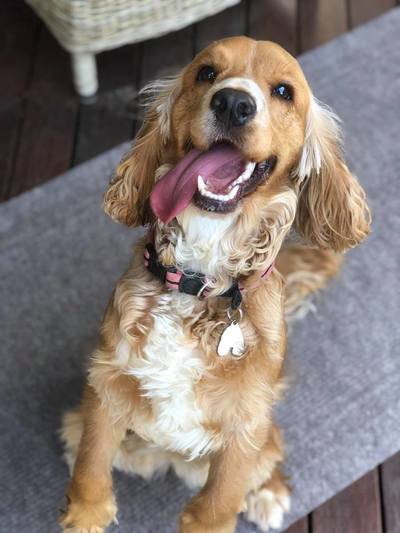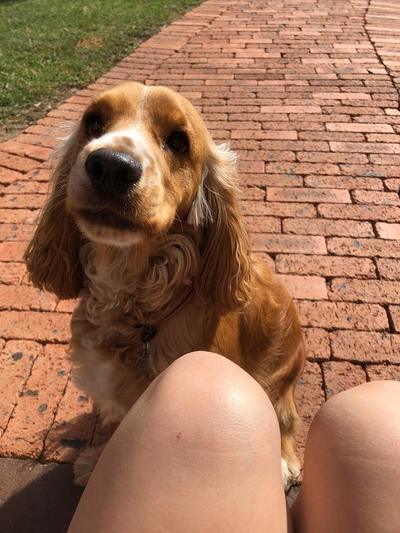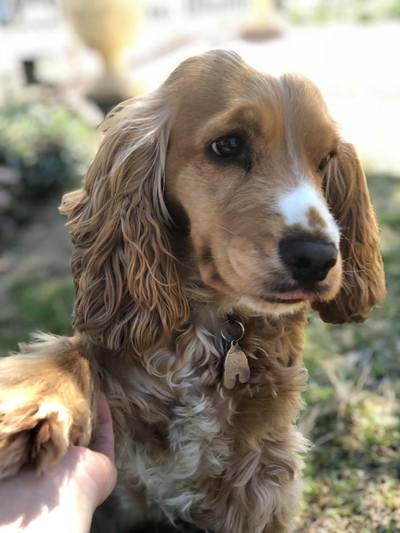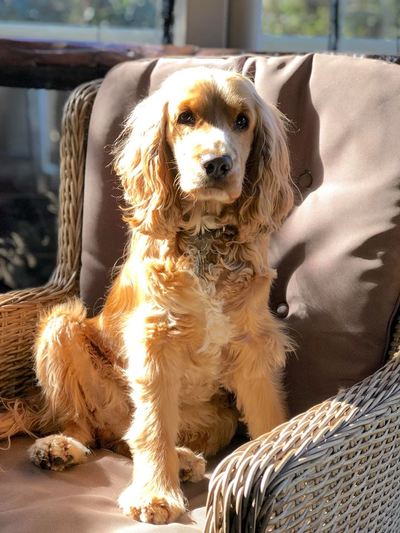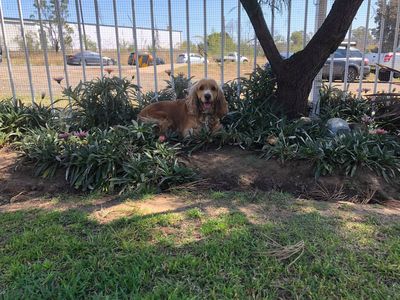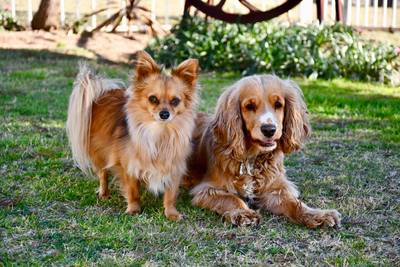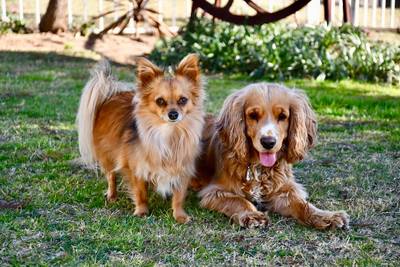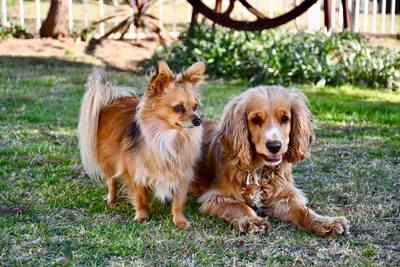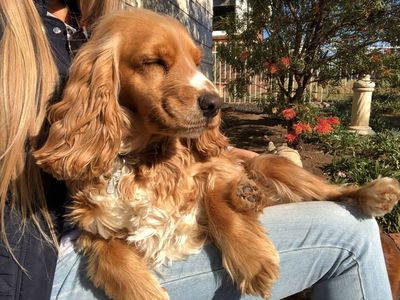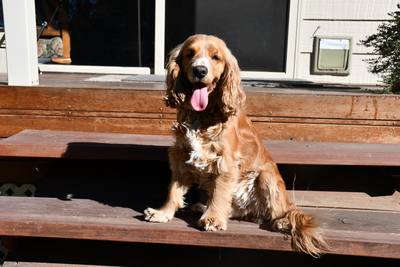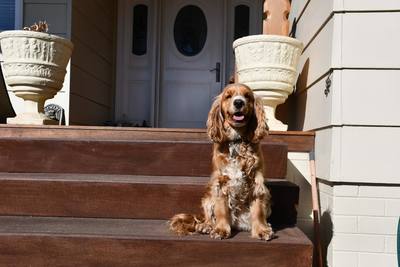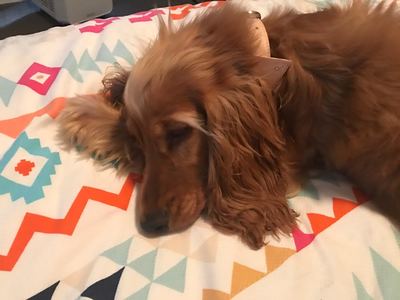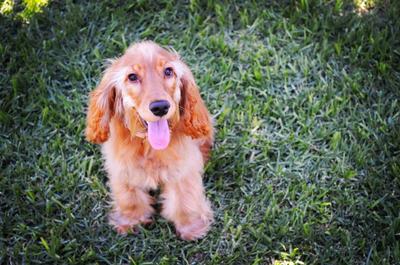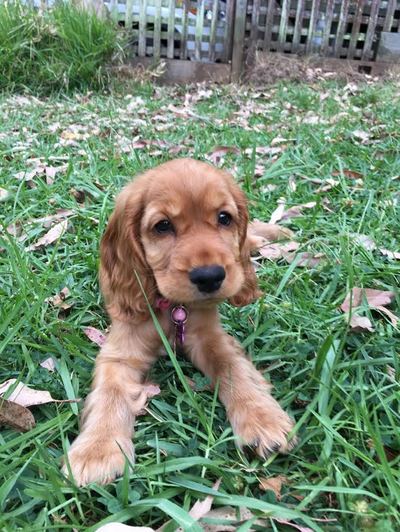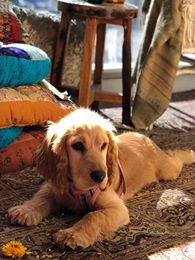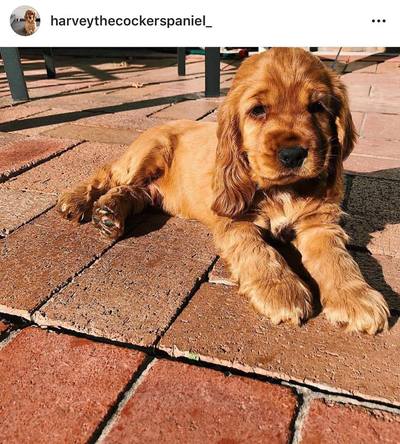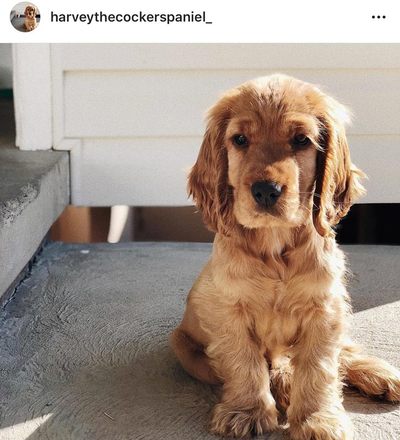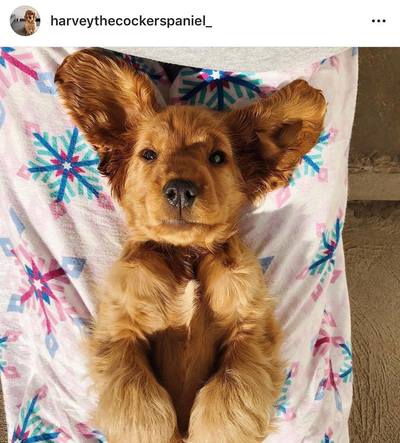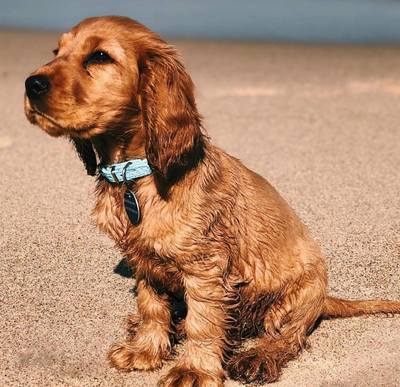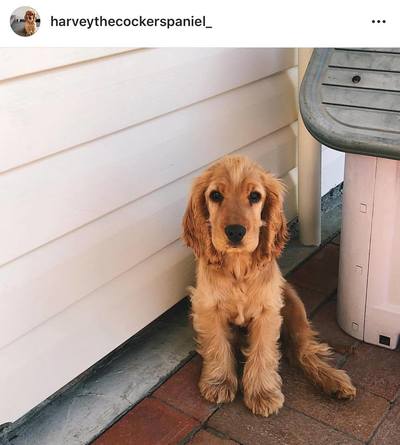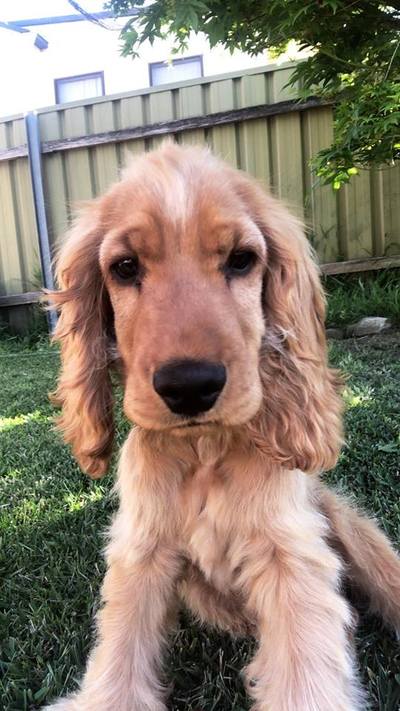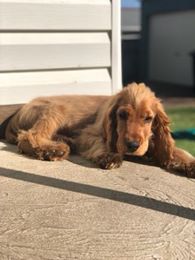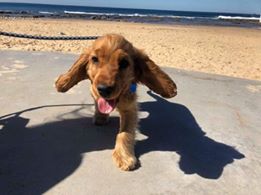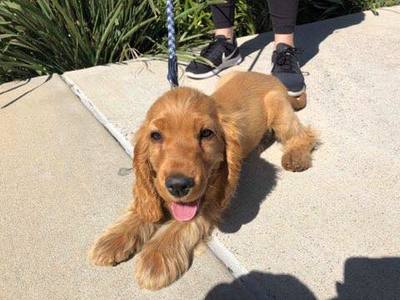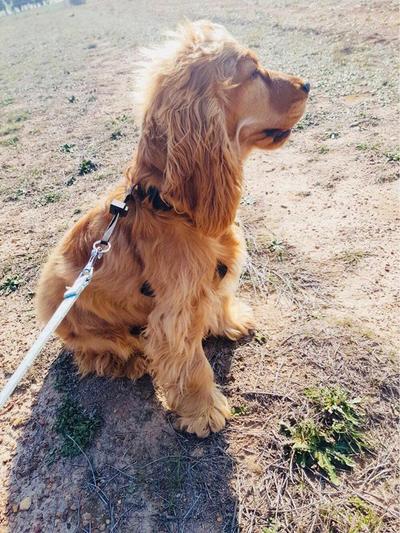Cocker Spaniel
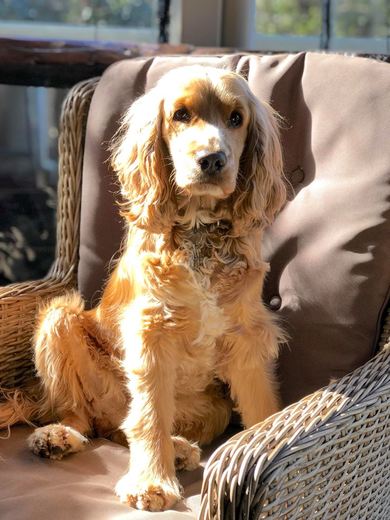
Breed: Cocker Spaniel
Temperament: affectionate, curious and playful.
Size: Small - Medium
Approximate Height: 38cm - 42cm
Approximate Weight: 12kg - 15kg
Lifespan: 10 - 14 years
Maintenance: medium
Recommended for: families, young or old.
Temperament: affectionate, curious and playful.
Size: Small - Medium
Approximate Height: 38cm - 42cm
Approximate Weight: 12kg - 15kg
Lifespan: 10 - 14 years
Maintenance: medium
Recommended for: families, young or old.
History of the Cocker Spaniel
Spaniel breeds have been around for many centuries, however was a rather general term for the type of dog whom came in varying sizes. It wasn't until more recent years, that the Spaniel category became subdivided in to the different classifications of Spaniels - with a range of sizing and characteristic variations. The Cocker Spaniel, is a smaller-medium sized of the Spaniels, with Springer Spaniels and Setter types being much larger in size.
The breeds purpose was predominately to flush and retrieve game, having a soft mouth, the dog was rather successful in hunting game birds (most successfully the woodcock, from where the name 'Cocker' Spaniel derived). The English Cockers purpose for land hunting proved outstanding, in both wet and dry terrain - with the breed still renowned for the abilities. Tough obedience and training is a must, the breed is one who follows commands well. To this day the Cocker Spaniel continues to prove itself in regards to hunting, retrieving, tracking, agility, fly ball, dock dogs, obedience trials, and watchdog capabilities.
Cocker Spaniels still have strong connections to their ancestry, and many British lines are still used in fields. In Australia, the Cocker Spaniel is more commonly a family pet, suitable to children or older couples. Though they can do well in the show ring (bench type rather than field type), less commonly are they a dog used for working here in Australia.
Personality, characteristics and temperament
The Cocker Spaniel is an incredible all round pet for many families. Robust and hardy, yet playful and affectionate, without being overly boisterous or demanding. An easy going and gentle natured dog, with a sweet and merry demeanour about them. Friendly and playful, some can be cautious around strangers - and will often warn you of their presence, though are unlikely to do harm or defend their property aggressively. Lively and pleasant natured, the Cocker Spaniel is a joy to be around, and can thrive with companionship of children and other pets (early socialisation and training is key, be cautious with small birds and similar due the natural instinct some will have to chase and retrieve).
Eager to please and happy to listen, the breed responds well to consistent yet gentle training methods. Outgoing and a rather happy go lucky kind of dog, the Cocker Spaniel is sociable and has endurance potential. Surprisingly sensitive, one cannot be harsh or domineering in their training and communication with the dog, though, the dog must also understand that however strong minded they may be - that they are not the boss (be stern, yet be gentle). Once a happy median is established, you and your Cocker will thrive off a common understanding and form great bonds. If you can not maintain an assertive yet calm nature with your dog, the more quiet or submissive puppy may be better suited, rather than the most outgoing and exuberant little dog. It is best to temperament match the puppy whom is most suitable for you and your family.
Cockers need to be given direction, in addition to affection and exercise. Those whom are allowed to become dominant and believe they are alpha over the human family counterparts, can often present as more behaviourally challenging (as with all breeds. Treat your dog with love and respect - providing guidance, allowing them to understand that they are in fact a dog). The dogs whom are given rules, direction, calm yet assertive authority, with structure and consistency, have the best nature and temperaments. It is clear that these dogs are much more settled, and have a greater understanding than those who have not begun basic obedience in early days. Training, and living in a family with a Cocker Spaniel, is fun, and most of all very rewarding.
Health of the Cocker Spaniel
A relatively robust and hardy dog, the Cocker Spaniel is not as prone to as many genetic disorders as some other breeds. Ear infections are an incredibly common, yet avoidable problem often seen in Cockers. Those beautiful, big and heavy ears can often retain moisture - allowing for ear infections to occur. A check by the vets to determine to the type of infection present, and generally an ear clean and couple weeks worth of ear drops will correct it. Signs that ear infections are present include scratching at the head, irritation around the ear area, head tilt or head shaking, and an odour is often present when the ear is lifted.
Heart disease is more common in the Cavalier and King Charles Spaniels, though heart murmurs are also important to rule out in the Cocker.
A well balanced diet is important for many reasons, including weight and dental health. Do not overfeed your Cocker Spaniel, as they can easily become overweight. A good quality dry biscuit, in addition to brushing your dogs teeth, will aid in preventing dental disease in your dog.
Luxating patellas can sometimes be noted in the Cocker Spaniels, with varying degrees of lunation. Some simply require management and don't greatly affect the dog, and some cases require surgery to repair.
Being responsible in terms of diet and exercise. Over exercising a young and under-developed Cocker Spaniel, can cause damage to their joints if they are rigorously excised or over worked. Gradually increase the amount and intensity of exercise your dog receives, being cautious with dogs especially of whom are still growing and maturing.
Housing
Considering, the Cocker Spaniel is a rather adaptable breed. They will enjoy having large open spaces to frolic if they wish, and trips to the local park. This is a breed who can successfully live in apartments, though will require daily walks and exercise if they are in such a dwelling. As long as they are given sufficient exercise, they can do fine in apartment and terrace living. In saying so, a yard is preferable and they will do best with their own space to freely roam and play. Many country Cockers are often known to be lounge lizards when they aren't out working. An all round friendly dog, whom will enjoy family life - whether it be rural or suburban.
Grooming
Cocker Spaniels will vary in regards to grooming, depending on the length of coat you choose to keep. This should be determined by not only what your personal preference is or what appeals to you, but what you can realistically maintain. Naturally, a longer coat will need brushing and combing more often (depending on the dog, anywhere from once to three times weekly for full coated Cockers, in addition to after walks or field work). If the coat has been clipped back, minimal brushing is required. Maintaining a show quality coat all year round, can be rather labour intensive - however, you may choose to keep a medium length coat and clip the feathering to allow for a neat and tidy look, without having to shave them. Though this is not the usual bench type groom, its much more maintainable for families with Cockers as pets.
Regularly checking your Cocker Spaniels ears is a must do! Clean with an ear cleaner from your vet as required or recommended by your veterinarian. Bath at a maximum of monthly, shampooing the coat more regularly can strip the coat of its natural bodily oils and cause skin irritations. Always use a dog shampoo, we often choose natural oatmeal types (such as Aloveen).
Get your dog use to be handled, this will assist in future grooming sessions and veterinary visits.
Training
Highly trainable which is surprising to some - the Cocker Spaniel though easy going and docile, will enjoy and thrive with training. Basic obedience is key in puppy hood, where your dog needs to learn basic commands, socialisation, and so on. These are essential tools that puppy need to progress in to a well rounded, and sound temperamented dog. Puppy preschool is ideal, then graduating on to adolescent classes will be beneficial. Cocker Spaniels have great potential, and have proved successful dogs in agility, dock dogs, fly ball, and other canine sports.
Spaniel breeds have been around for many centuries, however was a rather general term for the type of dog whom came in varying sizes. It wasn't until more recent years, that the Spaniel category became subdivided in to the different classifications of Spaniels - with a range of sizing and characteristic variations. The Cocker Spaniel, is a smaller-medium sized of the Spaniels, with Springer Spaniels and Setter types being much larger in size.
The breeds purpose was predominately to flush and retrieve game, having a soft mouth, the dog was rather successful in hunting game birds (most successfully the woodcock, from where the name 'Cocker' Spaniel derived). The English Cockers purpose for land hunting proved outstanding, in both wet and dry terrain - with the breed still renowned for the abilities. Tough obedience and training is a must, the breed is one who follows commands well. To this day the Cocker Spaniel continues to prove itself in regards to hunting, retrieving, tracking, agility, fly ball, dock dogs, obedience trials, and watchdog capabilities.
Cocker Spaniels still have strong connections to their ancestry, and many British lines are still used in fields. In Australia, the Cocker Spaniel is more commonly a family pet, suitable to children or older couples. Though they can do well in the show ring (bench type rather than field type), less commonly are they a dog used for working here in Australia.
Personality, characteristics and temperament
The Cocker Spaniel is an incredible all round pet for many families. Robust and hardy, yet playful and affectionate, without being overly boisterous or demanding. An easy going and gentle natured dog, with a sweet and merry demeanour about them. Friendly and playful, some can be cautious around strangers - and will often warn you of their presence, though are unlikely to do harm or defend their property aggressively. Lively and pleasant natured, the Cocker Spaniel is a joy to be around, and can thrive with companionship of children and other pets (early socialisation and training is key, be cautious with small birds and similar due the natural instinct some will have to chase and retrieve).
Eager to please and happy to listen, the breed responds well to consistent yet gentle training methods. Outgoing and a rather happy go lucky kind of dog, the Cocker Spaniel is sociable and has endurance potential. Surprisingly sensitive, one cannot be harsh or domineering in their training and communication with the dog, though, the dog must also understand that however strong minded they may be - that they are not the boss (be stern, yet be gentle). Once a happy median is established, you and your Cocker will thrive off a common understanding and form great bonds. If you can not maintain an assertive yet calm nature with your dog, the more quiet or submissive puppy may be better suited, rather than the most outgoing and exuberant little dog. It is best to temperament match the puppy whom is most suitable for you and your family.
Cockers need to be given direction, in addition to affection and exercise. Those whom are allowed to become dominant and believe they are alpha over the human family counterparts, can often present as more behaviourally challenging (as with all breeds. Treat your dog with love and respect - providing guidance, allowing them to understand that they are in fact a dog). The dogs whom are given rules, direction, calm yet assertive authority, with structure and consistency, have the best nature and temperaments. It is clear that these dogs are much more settled, and have a greater understanding than those who have not begun basic obedience in early days. Training, and living in a family with a Cocker Spaniel, is fun, and most of all very rewarding.
Health of the Cocker Spaniel
A relatively robust and hardy dog, the Cocker Spaniel is not as prone to as many genetic disorders as some other breeds. Ear infections are an incredibly common, yet avoidable problem often seen in Cockers. Those beautiful, big and heavy ears can often retain moisture - allowing for ear infections to occur. A check by the vets to determine to the type of infection present, and generally an ear clean and couple weeks worth of ear drops will correct it. Signs that ear infections are present include scratching at the head, irritation around the ear area, head tilt or head shaking, and an odour is often present when the ear is lifted.
Heart disease is more common in the Cavalier and King Charles Spaniels, though heart murmurs are also important to rule out in the Cocker.
A well balanced diet is important for many reasons, including weight and dental health. Do not overfeed your Cocker Spaniel, as they can easily become overweight. A good quality dry biscuit, in addition to brushing your dogs teeth, will aid in preventing dental disease in your dog.
Luxating patellas can sometimes be noted in the Cocker Spaniels, with varying degrees of lunation. Some simply require management and don't greatly affect the dog, and some cases require surgery to repair.
Being responsible in terms of diet and exercise. Over exercising a young and under-developed Cocker Spaniel, can cause damage to their joints if they are rigorously excised or over worked. Gradually increase the amount and intensity of exercise your dog receives, being cautious with dogs especially of whom are still growing and maturing.
Housing
Considering, the Cocker Spaniel is a rather adaptable breed. They will enjoy having large open spaces to frolic if they wish, and trips to the local park. This is a breed who can successfully live in apartments, though will require daily walks and exercise if they are in such a dwelling. As long as they are given sufficient exercise, they can do fine in apartment and terrace living. In saying so, a yard is preferable and they will do best with their own space to freely roam and play. Many country Cockers are often known to be lounge lizards when they aren't out working. An all round friendly dog, whom will enjoy family life - whether it be rural or suburban.
Grooming
Cocker Spaniels will vary in regards to grooming, depending on the length of coat you choose to keep. This should be determined by not only what your personal preference is or what appeals to you, but what you can realistically maintain. Naturally, a longer coat will need brushing and combing more often (depending on the dog, anywhere from once to three times weekly for full coated Cockers, in addition to after walks or field work). If the coat has been clipped back, minimal brushing is required. Maintaining a show quality coat all year round, can be rather labour intensive - however, you may choose to keep a medium length coat and clip the feathering to allow for a neat and tidy look, without having to shave them. Though this is not the usual bench type groom, its much more maintainable for families with Cockers as pets.
Regularly checking your Cocker Spaniels ears is a must do! Clean with an ear cleaner from your vet as required or recommended by your veterinarian. Bath at a maximum of monthly, shampooing the coat more regularly can strip the coat of its natural bodily oils and cause skin irritations. Always use a dog shampoo, we often choose natural oatmeal types (such as Aloveen).
Get your dog use to be handled, this will assist in future grooming sessions and veterinary visits.
Training
Highly trainable which is surprising to some - the Cocker Spaniel though easy going and docile, will enjoy and thrive with training. Basic obedience is key in puppy hood, where your dog needs to learn basic commands, socialisation, and so on. These are essential tools that puppy need to progress in to a well rounded, and sound temperamented dog. Puppy preschool is ideal, then graduating on to adolescent classes will be beneficial. Cocker Spaniels have great potential, and have proved successful dogs in agility, dock dogs, fly ball, and other canine sports.


